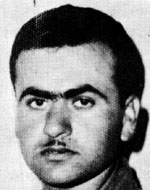Saba, Fouad
Son of Saad and Mofida. He was born in 1942 in Isfiya. After graduating from elementary school in the village he moved to the Orthodox school in Haifa. After graduating successfully, he was drafted into the IDF in November 1962 and at the beginning of his career Fuad became a serious guy and liked all his friends in the unit. However, since he wanted to continue his academic studies, he was later transferred to the North as a remedial officer, but even here he could not find a suitable option for studies and decided to be discharged from the IDF and continue to study. In his last position, he received the warm appreciation of his subordinates and commanders for his devotion to the job and for his great ability to perform. After being discharged with the rank of lieutenant, he was accepted to the University Institute of Haifa where he studied literature and education. During his studies, he taught in the village. He was devoted wholeheartedly to the subjects he taught and to the activities he would conduct, and in this way he succeeded in his studies and activities outside the field of study. He found his death while serving in the reserves after the Six-Day War and then travels between Rafah and Gaza. For four days he fought bitterly for death and died on August 4, 1967. He left a wife and a baby. Was brought to eternal rest in the military cemetery in Isfiya at a full military ceremony in which the leaders of the community, young people and acquaintances, laid out his profile. One of the eulogies on his grave expressed his sincere appreciation for his character and character, calling Fuad “a good friend and a dear brother who worked hard to stabilize brotherhood and friendship between the villagers and the young people. On the “forty” day of his fall, a public library was established in his name at the vocational high school in Isfiya; This library, which was founded to commemorate the name and character of Fuad, whose ambition to raise the level of education among the young people of the village, has always contributed to its readers and admirers. Today it contains a large number of books in Hebrew, Arabic and English. His name and memory were commemorated among the other Druze fighters in the book “Covenant of Blood” by Musabah Halabi.
